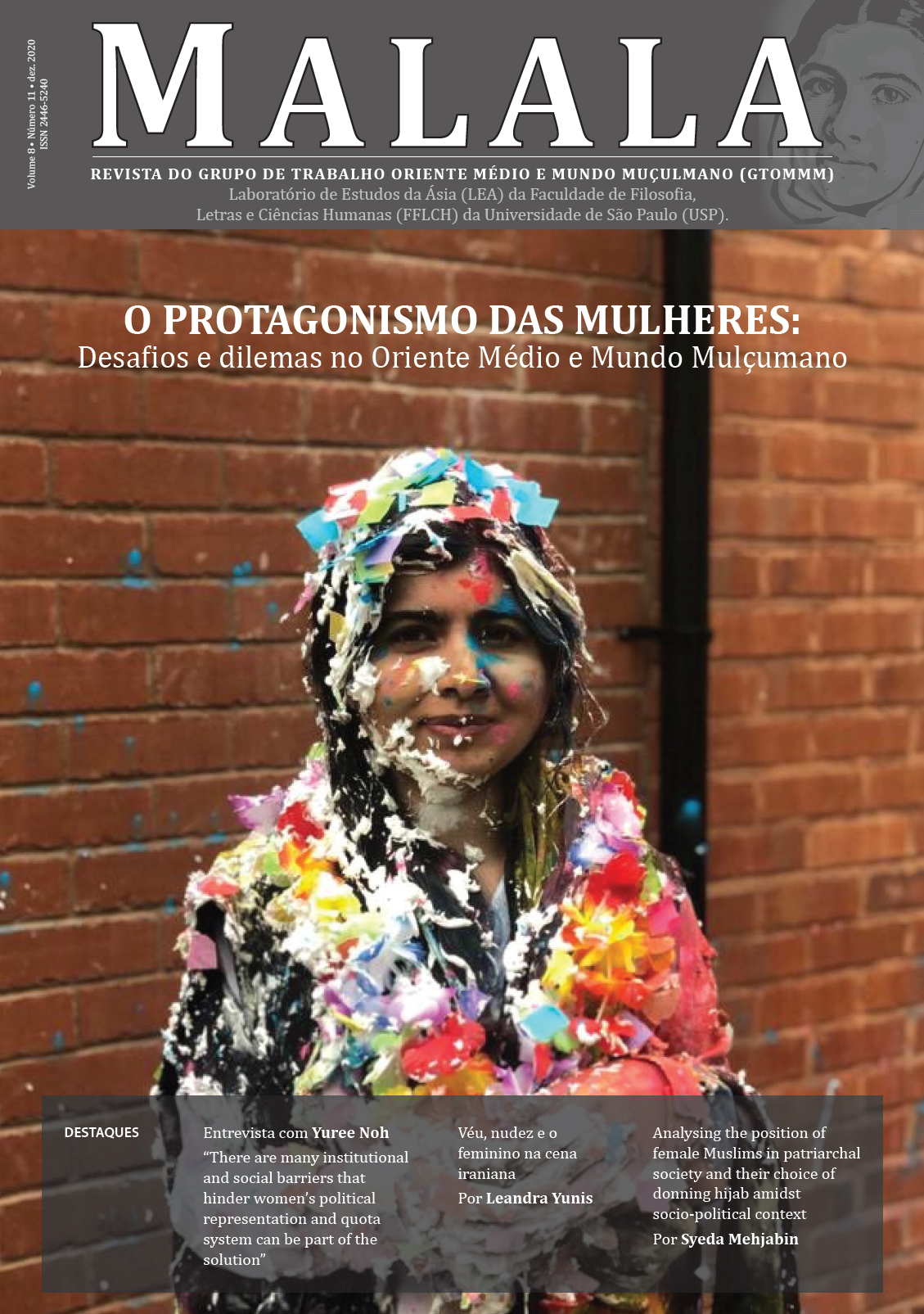Islamic feminism in Tunisia’s political transition: advances and setbacks.
DOI:
https://doi.org/10.11606/issn.2446-5240.malala.2020.161809Keywords:
Tunisia, Arab Spring, Islamic FeminismAbstract
This essay seeks to investigate the evidence of advances in women’s rights in Tunisia in its post-Arab Spring (2010 – 2014), through the analytical categories of Islamic Feminism and Postcolonialism. Due to the political and social upheaval reflected in the popular manifestations calling for greater freedoms, and showing a gap between the rights guaranteed by the constitutional text existing at the time, it is hypothesized that this opportunity would have been seized by the women in Tunisia, which their fight is now symbolized in the 2014 constitution. Therefore, the constitutional stretches of 1959 and 2014 are observed, and the reflexes of gender truggles are evaluated. It is concluded that women were successful in their struggle, at least in the sense that their rights and duties were guaranteed in the new constitution. Furthermore, it was inferred, from their gains, the confirmation that Islamic feminism should not be understood from the Western perspective, since each movement has its own particular demands.
Downloads
References
ABU-LUGHOD, Lila. Do muslim women need saving?. Massachusetts: Harvard University
Press, 2013.
AHMED, Leila. Women and gender in Islam. 2 ed. New Haven: Yale University Press, 1992.
ALEYA-SGHAIER, Amira. The Tunisian Revolution: The Revolution of Dignity. The Journal of
the Middle East and Africa, v. 3, n. 1, p. 18-45, 2012.
ALI, Kecia; LEAMAN, Oliver. Islam: The Key Concepts. Routledge: Londres e Nova Iorque, 2008.
ARIEFF, Alexis. Political transition in Tunisia. Congressional Research Service, abr. 2011.
BARBOSA, Francirosy Campos. Jihadistas são todos muçulmanos. Disponível em: https://
icarabe.org/politica-e-sociedade/jihadistas-sao-todos-muculmanos. Acesso em: 20 de
abril de 2020.
BRANCOLI, Fernando. Islã Político, Direitos Humanos e Democracia: rearticulações e possibilidades.
Monções, v. 3, n. 6, p. 149-168, 2014.
Fernando. Primavera Árabe: praças, ruas e revoltas. São Paulo: Desatino, 2013.
CHARRAD, Mounira; ZARRUGH, Amina. Equal or complementary? Women in the new Tunisian
Constitution after the Arab Spring. The Journal of North African Studies, v. 19, n. 2, p.
-243, 2014.
DEMANT, Peter. O mundo muçulmano. 3 ed. São Paulo: Contexto, 2018.
ELÍBIO JR, Antônio Manoel; ALMEIDA, Carolina Soccio Di Manno de; LIMA, Marcos Costa.
Edward Said e o Pós-Colonialismo. SÆculum – Revista de História, v. 29. João Pessoa, 2013.
ESPOSITO, John. Unholy war: terror in the name of Islam. New York: Oxford University
Press, 2002.
FERABOLLI, Silvia. Relações Internacionais do Mundo Árabe (1954 – 2004): os desafios para
a realização da utopia pan-arabista. Contexto Internacional, Rio de Janeiro, v. 29, n. 1, p.
-97, 2007.
FOX, Jonathan; SANDLER, Shmuel. Bringing Religion into International Relations. New York:
Palgrave MacMillan, 2004.
FRANCO, Clarissa de. Feminismo Islâmico face ao feminismo secular: uma nova consciência
de gênero de um Oriente que rejeita a Ocidentalização. Revista Último Andar, n. 26, pp.
-92, 2016.
GRAMI, Amel. Gender equality in Tunisia. British Journal of Middle Eastern Studies, v. 35,
n. 3, p. 349-361, 2008.
GROSFOGUEL, Ramon. 1492 and the Formation of Modernity. Islamic Human Rights Commission.
Disponível em: https://www.ihrc.org.uk/publications/briefings/11878-1492-andthe-
formation-of-modernity/. Acesso em: 15 de abril de 2020.
HAJJAMI, Aïcha El. A condição das mulheres no Islã: a questão da igualdade. Cadernos Pagu,
v. 30, p. 107-120, 2008.
HALLIDAY, Fred. The Middle East in International Relations: Power, Politics and Ideology.
New York: Cambridge University Press, 2005.
JOHNSON, Toni; SERGIE, Mohammed Aly. Islam: governing under Sharia. Council on Foreign
Relations. Disponível em: https://css.ethz.ch/en/services/digital-library/publications/
publication.html/182296. Acesso em 10 de junho de 2020.
KADRI, Janna. Contribution des femmes à la construction de la nation, au processus révolutionnaire
et au processus transitionnel en Tunisie. Université d’Ottawa, pp. 1-41, 2018.
LEWIS, Bernard. What went wrong?: Western impact and Middle Eastern response. New
York: Oxford University Press, pp. 1-180, 2002.
LIMA, Cila. Feminismo islâmico: mediações discursivas e limites práticos. Tese de doutorado
para o Programa de História Social, Faculdade de Filosofia, Letras e Ciências HUmanas,
Universidade de São Paulo, 2017.
MAKDISI, Samir. Reflections on the Arab Uprisings. Combining Economic and Political
Development: The Experience of MENA. International Development Policy series 7. Geneva:
Graduate Institute Publication, Boston: Brill-Nijhoff. Pp. 22-40, 2017.MATA, Maria Jesús
Rubiera. La mujer en el Corán como fuente de la Xaria: posibilidad de nuevas interpretaciones.
Aneles de Historia Contemporánea, 1998.
MOGHISSI, Haideh. Feminism and Islamic Fundamentalism: the limits of postmodern analysis.
London & New York: Zed Books, 2002.
PICKARD, Duncan. Challenges to legitimate governance in post-revolution Tunisia. The Journal
of North Africa, v. 16, n.4, p. 637-652, 2011.
SAID, Edward W. Orientalismo: O Oriente como invenção do Ocidente. São Paulo: Companhia
das Letras, 2004.
TREACHER, Amal. Reading the Other: women, feminism, and Islam. Journal of Studies in
Gender and Sexuality, v. 4, n.1, pp. 59-71, 2003.
TUNISIA. Constitution (1959). Constitution of Tunisia. Tunis, Tunisia: Constituent Assembly,
jun. 1959.
TUNISIA. Constitution (2014). Constitution of Tunisia. Tunis, Tunisia: Constituent Assembly,
jan. 2014.
Downloads
Published
Issue
Section
License
Copyright (c) 2020 Ana Gabriela Costa Reis

This work is licensed under a Creative Commons Attribution-NonCommercial-ShareAlike 4.0 International License.
Esta revista oferece acesso livre ao seu conteúdo, seguindo o princípio de que disponibilizar gratuitamente o conhecimento científico ao público proporciona maior democratização mundial do conhecimento. Não será cobrado nenhum tipo de taxa ao longo do processo de submissão de trabalhos e publicação da revista, bem como para leitura, download, cópia, distribuição, impressão, pesquisa ou referência após sua publicação. Leitores e partes interessadas são livres para compartilhar (copiar ou distribuir o material em qualquer mídia e formato) e para transformar ou adaptar partes do material desde que para uso não comercial e desde que o crédito apropriado seja dado ao autor e à Revista, indicando de que forma os dados foram utilizados e/ou manipulados.





